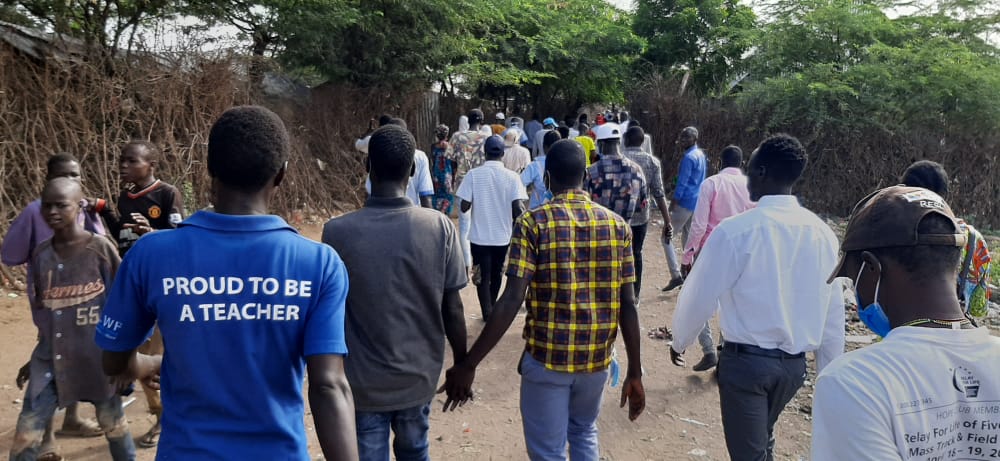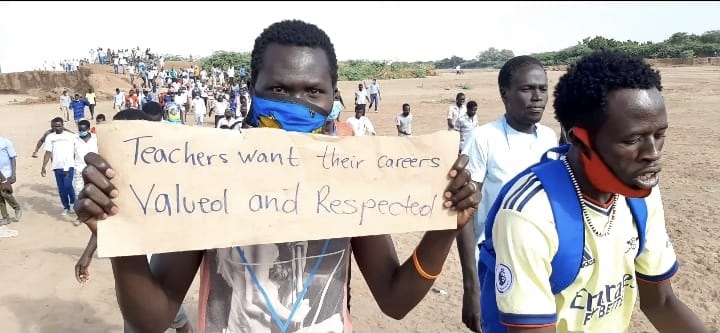By Qaabata Boru & Baluu W. Makuach – KANERE Volunteer Writers, September 2021
Primary school teachers across camps suspended all the classroom activities by sending learners back home.

According to head teachers interviewed by KANERE, delay of payment is the main reason leading to the strike.
“Teachers were not equally paid, and pay is always late by one or two months,” school head teacher from camp 2 told KANERE.
Classes are cancelled Friday, September 10th, 2021 for all 21 primary schools across Kakuma with approximately 53,000 students having missed classes.
A demonstration was organized by teachers and joined by students in demands of a pay increase and teachers welfare from the Lutheran World Federation (LWF).
The KANERE team on the site found that teachers have had their protest well planned; they first assembled at the Equatoria Boys football field before making their way to the UNHCR main gate.
However, before the teachers departed the football field, LWF vehicle was around with two to three staff on board. Those LWF staffers were trying hard to convince teachers not to go on strike, one of the key figure from the LWF at the scene was identified as Okello who they said were unable to heed teachers long time complaints.
By around 9:00 am local time, staged demonstration and situation was tense, though protesters were peaceful.
The teachers’ march was from far as people arrived in small groups at football field at the junction just before the old cemetery, behind Kakuma 1 Zone 1 Block 1. There were two vehicles on site both with employees in the education department, who did not manage the convinces the teachers to stop the planned protests.
“For us this was the D-Day to get our voices heard so there was no point of managers trying to convince teachers not to strike when they failed us for many years. We basically need our rights and rights to gain our lost labor rights,” said Pajok, a teacher in a Zone 4 school.
“We could see the likes of Mr. Okello and other education officers, but we don’t have trust in them anymore. We need advocates but not cartels,” Pajok added.
According to another teachers’ rep, Mr. Okello and Quality Assurance and Standard Officer – QASO, who were sent by the LWF office in an attempt to stop the planned protests where both of these employees were seen outstretching their hands asking teachers to stop, the teachers told them ‘This is not an office’ in rejection pointing at where they were then proceed on Kakuma – Lokichoggio Highway.
Some of the posters illustrates “teachers want their careers valued and respected.”

The demonstration was right outside the UNHCR Sub Office premises, before the situation became tense when police arrived and started firing teargases and chasing after the crowd.
Demonstrators alleged that police disrupted a peaceful setting which turned chaotic. “Aid agencies including police should learn to respect refugee rights to free expression and assembly,” a refugee activist who wish not to be identified told KANERE.
An eye witness confirmed that two demonstrators have been arrested, including a member of KANERE press team at the scene, who was later freed on same day.
In a message seen by KANERE, LWF has apologized to teachers for the later payment that lead to the strike.
On September 13th, 2021, teachers boycotted a dialogue meeting but agreed to hold discussions with the heads of agencies at the UNHCR compound on the 7th day of their strike.
During a week-long protest, camp primary schools remain closed. This is evident as the gates to most schools remain closed but some learners and national teachers have reported in some schools even though no activities have been activated.
In a petition, of copy of which was shared with KANERE, refugee teachers have demanded pay raises and teachers welfare that must include provision of lunches and allowances.
“We have been neglected for decades. We are asking LWF in the strongest term to treat all the teachers equally regardless of their status or background,” read a section of teachers petition.
TEACHERS GREIVANCES SOLVED
The teachers’ meetings with the agencies was successful and arrangements were made to resume classroom activities according teachers reps who spoke with KANERE.
“We’ve received reaffirmation that pay will be on a timely basis each month and that lunches will be provided immediately teachers ends strike,” a teachers’ rep from camp 1 confirmed.
In Kakuma, a typical school day starts at 6:40 am and ends at 4:30 pm where teachers are expected to remain in schools without breakfast and lunches or refreshment, as some of complaints raised.
“If they (LWF) would like to continue paying locals or national teachers more and better salary, then they should make proper shifts of time allocation and reduce work load from refugee teachers, there is huge gaps of inequality,” a teacher from Kadugli told KANERE.
The most pressing issues at camp schools includes a lack of classrooms, desks, chairs, textbooks and toilets.
Despite the overcrowding, neither LWF nor UNHCR has any clear policies that necessitate a cap on the number of enrolled students in camp schools. The average classroom to a child ratio has remained 1:156 for many years.
KANERE finds that the most outspoken grievances surrounding the teachers strike was lack of incentive or wage harmonization, lack of teacher’s welfare, and lack of equal pay for an equal work in comparison with national staff, or with teachers in other refugee camps in other regions, such as Dadaab.
The UNHCR Spokesperson in Kenya, Eujin Byun, confirms that refugee teachers have the right to bring their grievances and to be heard.
“Education is UNHCR’s top priority, and we value important roles played by both refugees and national teachers in the camp schools. We closely work with the stakeholders to address the issue,” said Eujin in a meeting with KANERE.
“This is not only about the delayed payment but it’s an issue being triggered by this challenging time (COVID-19 Pandemic) – we’ve also added additional communication channels with the refugee teacher’s representatives in Kakuma,” Eujin added.
Most recently, LWF has replaced its long-term serving Kakuma coordinator, Moses Mukhwana though it’s not apparently clear if such move was related to the teachers strike as press enquiries were not responded to.
In spite of funding shortages and remoteness, LWF has been a critical implementing partners in primary education with the UNHCR since the established of Kakuma in 1992.
Now, the teachers’ hope is that pay is raised officially in the next fiscal budget, among other things to improve inclusive refugee worker’s welfare in the education sector.

1 reply on “Kakuma Teachers’ Strike”
[…] their coverage has highlighted Camp Kakuma’s protests for equal pay for teachers and the improvement of teachers’ working conditions. Boru attributes citizen journalism to […]